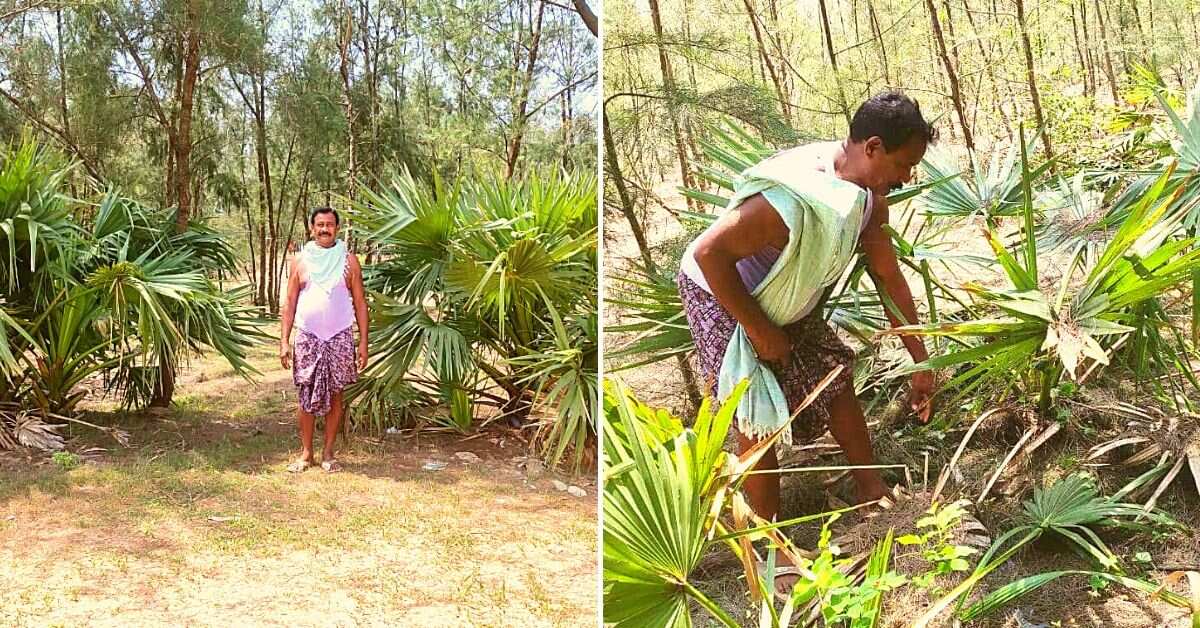After Odisha Cyclone, Retired Jawan Spends Pension Money to Plant 50,000 Saplings
“Spending lakhs of his own money, he used to walk around collecting palm seeds and burying them like green dams.”

Nearly 21 years ago, retired army jawan, Krushna Chandra Biswal began planting palm, jamun, mango and other fruit saplings along the coastline of his village, Gundalaba, which is located in Odisha’s Puri district.
Today, he has planted around 50,000 saplings over an area of 5 km upto the Gumuti Keshab temple of a nearby village (Daluakani) with the hope that this effort will result in tree cover that will stand as a bulwark against cyclones and help prevent soil erosion.
“I had come home on a brief holiday a few days after the 1999 super cyclone and found that it had ravaged my village, the entire Puri district and several other parts of Odisha. The large-scale devastation that it had caused to human life, property, animals and the environment was heart-breaking. Tonnes of sand from the nearby Astaranga beach had been swept into our village. That was when I decided to plant a few trees like mango, palm and casuarina near my house and restore some greenery to what looked like a vast stretch of barren land,” says Krushna, speaking to The Better India.
While Krushna only got to see the aftermath of the 1999 cyclone, he was in Odisha in May 2019, when Cyclone Fani hit, and had his first real-life experience of what it’s like to encounter nature’s fury.
“A few days later, I gathered a few kids from my village and proposed a massive feast with local delicacies if they agreed to join my plantation campaign along the seashore. The promise of a feast was too tempting for them. So, with their support, I was able to plant about 50,000 seeds and saplings during the monsoon season in three months along a 5 km stretch. I chose tree varieties like palm, mango, jamun, neem etc. that protect against soil erosion, act as a solid fence against events like cyclones and also bear fruits for the people, herbivorous animals and birds of the area,” he says.
“It was after his retirement in January 2005, when Krushna Bhai took up environmental protection. As natural disasters hit the coast at different times of the year, he started collecting and planting palm seeds in the forests of his area less than 15 years ago, which is said to be the first such venture in coastal Odisha. Spending lakhs of his own pension money, he used to walk around collecting palm seeds, taking them with his bicycle, lining them 100 meters away from the sea and burying them like green dams,” says Soumya Ranjan Biswal, a local wildlife activist.

Planting and Maintaining were Challenges
However, the entire exercise hasn’t been without its challenges.
“When I fervently started planting trees after Fani, forest department officials had suspicions that I was trying to stealthily occupy government land. The misunderstanding was due to a lack of awareness on both my part and that of the forest department. But after hearing me out and physically inspecting my afforestation efforts, they were convinced that I was doing it purely as a responsible citizen and I had no malicious intentions,” informs Krushna.
The other challenge was that of maintenance. The bigger and mature trees that shed leaves on or around the saplings they had planted have to be cleared from time to time. He resorts to his usual ‘feast formula’ to gather young eco-warriors for the job. Of the dozens of mango trees that he planted after the 1999 cyclone, only two dozen have survived.
“The forest department cut them off along with other wild trees because then they did not know who had planted them. But that’s alright. There was a genuine misunderstanding. There are a few jamun, neem and casuarina trees that are surviving and helping prevent soil erosion. In addition, these trees serve food for birds,” he adds.
Meanwhile, the ones that Krushna planted post Cyclone Fani are still very young and will take a few more years to grow and guard against cyclones and soil erosion.
He says he hasn’t kept track of the expenditure incurred. “I plant trees only to fulfil my duty as a responsible citizen. After all, this is my own village, my home,” he says.

“Biswal is doing an incredible job and his plantation is helping the villagers to stay safe from the havoc of cyclones. It also helps prevent soil erosion and provides firewood to the villagers. Many environmentalists often visit him to discover the secret of his passion for plantation,” says environmentalist Jayakrushna Panigrahi, speaking to the Orissa Post.
“The presence of palm trees also helps reduce non-natural deaths due to lightning in the future. Also it can provide the habitats for disappeared birds like baya weaver and other birds and animals. He also took the initiative to plant various fruit-bearing trees and shrubs in the village forest with his children and friends, which has eliminated the food shortages of wildlife, birds, etc. in the summer,” adds Soumya.
There were days when Krushna was fighting to protect the country. Today, he is dedicating his life to environmental protection and stands as a green hope for the local area.

(With inputs from Raj Sampad)
(Edited by Gayatri Mishra)
Like this story? Or have something to share? Write to us: [email protected], or connect with us on Facebook and Twitter.

Similar Story

They Said I’d Lost My Mind When I Quit My Job to Cook; Now I’m Top 12 on MasterChef
Avinash Patnaik quit his job as an agriculture officer to pursue his love for flowers and food. Today, he is among the top 12 participants on MasterChef India Season 7, where he puts floral spins on Odisha’s traditional cuisine.
Read more >
If you found our stories insightful, informative, or even just enjoyable, we invite you to consider making a voluntary payment to support the work we do at The Better India. Your contribution helps us continue producing quality content that educates, inspires, and drives positive change.
Choose one of the payment options below for your contribution-
By paying for the stories you value, you directly contribute to sustaining our efforts focused on making a difference in the world. Together, let's ensure that impactful stories continue to be told and shared, enriching lives and communities alike.
Thank you for your support. Here are some frequently asked questions you might find helpful to know why you are contributing?


This story made me
-
97
-
121
-
89
-
167












